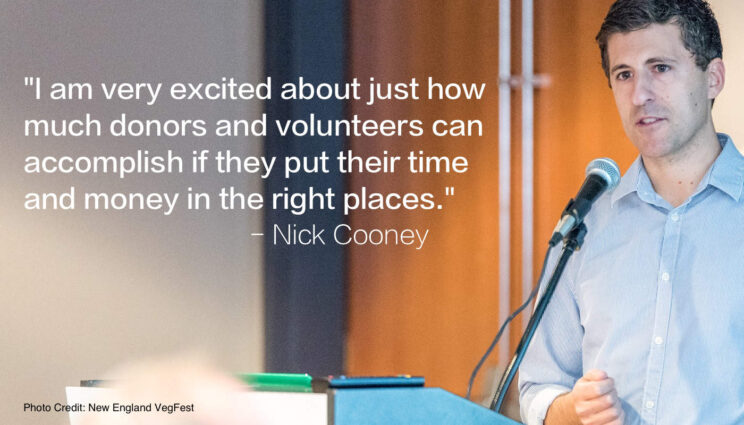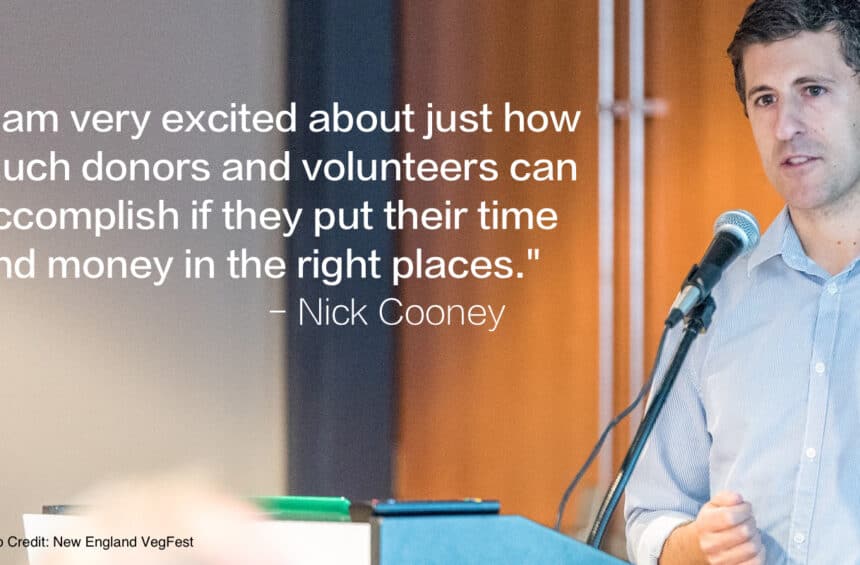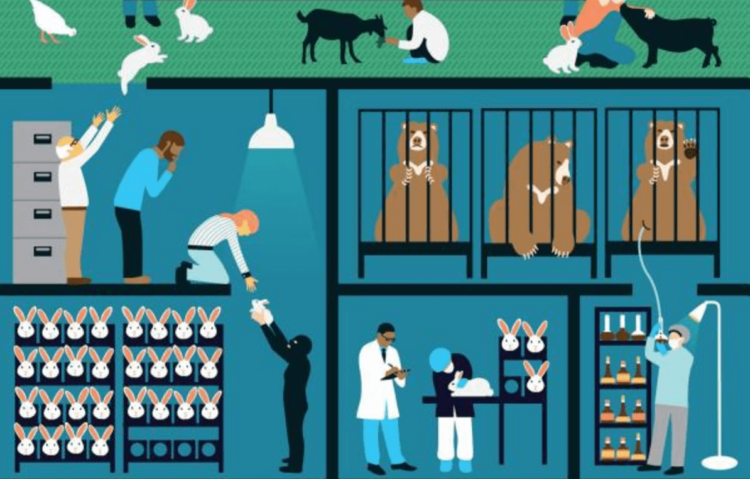Effective Activism with Nick Cooney


Nick Cooney is the author of three books the help people become more effective change makers, and his latest book just hit shelves this week! It’s called How To Be Great At Doing Good: Why Results Are What Count and How Smart Charity Can Change the World, and it digs into the (often counterintuitive) things that we as volunteers, activists, and donors should consider to make our time and money go further. How does effective activism work?
Nick is the Director of Education at Mercy For Animals and the founder of The Humane League. His work has been featured in hundreds of media outlets, including the Wall Street Journal, TIME magazine, and National Public Radio, and he has lectured extensively throughout the United States and Europe on how to carry out charity effectively. His other books include Change of Heart: What Psychology Can Teach Us About Spreading Social Change and Veganomics: The Surprising Science on What Motivates Vegetarians, from the Breakfast Table to the Bedroom
.
We caught up with Nick just after his book was launched for an interview to share with you. Enjoy!
Nick, what inspired you to write How to Be Great at Doing Good?
Both frustration and excitement! On the one hand, I felt frustrated with the fact that a number of animal protection organizations (and many non-animal charities as well) and the staffers working at them seemed to be making decisions that were so clearly not in animals’ best interested. It was so obvious to me that many decisions about which programs to focus on and where to spend money were based not on what would help the most animals or do the most good, but on other factors like “what have we done in the past,” “what do we feel we’re good at,” and so on. As a result, a huge amount of money is wasted and we spare far fewer animals than we as a movement could. I want that to change.
At the same time, I am very excited about just how much donors and volunteers can accomplish if they put their time and money in the right places. It’s just crazy how much good each one of us has the possibility to do, and how many animals each one of us has the possibility to spare, if we make smart decisions about which projects and charities to support. Even those with a modest income and modest amount of time to volunteer can spare tens of thousands of animals over their lifetime. But only if we think critically about where to put our limited time and money.
We tend to put a huge emphasis on “following our passions,” but in your book you discuss how that can actually be detrimental to the causes for which we’re working. Why is that?
Common sense charity advice, and live advice for that matter, is to “follow our passion.” If we just want to be happy and feel good, that may be useful advice to follow. But if our goal is to actually change the world and spare as many animals as we can, it’s terrible advice. Odds are the causes and things we happen to feel passionate about right now are not the places where our time or money will go the furthest and do the most good for animals.
Sure, if we’re passionate about a particular cause we’ll probably give a bit more of ourselves—maybe donate more, volunteer more, and do a better job. But there are such incredibly vast differences in impact between different types of animal protection work (for example shelter work, wildlife rescue, sanctuaries, and vegan advocacy), and those differences drown out any advantage that being passionate may confer.
It’s better to look at all the work being done for animals, decide where we can help the greatest number of animals, and then support that work, even if we don’t feel any passion for it right now. That is what’s in animals’ best interests. Plus, in time we’ll probably become passionate about the new cause anyway, simply as a result of becoming engaged in it.
What are the top mistakes you see people make when it comes to their philanthropic efforts?
A massive survey of 15,000 American donors to charity, carried out in 2010, asked people “What is the main factor you look to in deciding which charities to support?” Only 3% said that the main factor they looked to was “How much good that charity does, relative to other charities.” That is the big mistake that we make: basing our charity decisions on anything other than what we think will help the greatest number of animals.
We get emotionally moved by stories of cute individual animals who were rescued or are in need of immediate help; we get excited by confrontations (see for example the popularity of Whale Wars) and whatever the current hot-button animal issue is; and we end up donating to charities that spend a large amount of money to help a very small number of animals. We overlook charities that are doing less sexy work, but that would help far, far more animals with our donation.
How can we ensure that our hard-earned charitable donation dollars will be used efficiently?
By donating to charities that have a track record of helping a huge number of animals for a modest amount of money. AnimalCharityEvaluators.org is a great independent non-profit advisory organization that informs donors on which charities are likely to help the greatest number of animals with your donation—I highly recommend visiting their site and letting their research and recommendations inform your giving.
To get into the weeds a bit, if you want to help the most animals and reduce the most animal suffering, focus your giving on organizations that spend all or nearly all of their budget on vegan/vegetarian/meat-reduction advocacy and corporate, legislative, and media work to reduce the suffering of farmed animals. This sort of work is far more efficient than shelter, sanctuary or wildlife work. According to ACE’s research, donating $100 bucks to a smart farm animal advocacy organization will help over 100 animals. Donating the same amount to a shelter, sanctuary, or wildlife protection organizations will – in most cases – not even be enough to save one single animal.
Most of our readers here at World of Vegan are eager to make a positive impact on the world. If they could make just one behavioral change in order to have a bigger influence on causes they care about, what should that be?
Can I give two behavior changes? 🙂 First, to consistently ask yourself this question: “How can I help more animals this month than I did last month?” And second, be as active as you can to promote veg eating! Pass out booklets and vegetarian starter guides, show videos and share videos on social media, share books and movie recommendations with others. It makes an incredible difference.
You have written two other books. Can you tell us about those books, and your goal as an author?
The first, Change of Heart, shares psychological tools we can use to be more effective at persuading others to make the compassionate lifestyle changes we’d like them to make. The second, Veganomics
, summarizes the takeaways of 500+ studies carried out on vegetarians and vegetarian eating, showing us who’s going veg, why, and how we can inspire more people to do the same.
The common thread through all three books is taking an analytical approach to doing good. Research, data, and calculations are our friends. They can help us do so, so much more good for animals, if we pay attention to them and base our decisions off them.
What final thoughts would you like to share with the World of Vegan community?
The fact is that you can spare far more animals than you are right now without donating one more dollar to charity or volunteering one more hour of your time. All it takes is making smarter charity decisions.
I hope you’ll check out the book, as I think it will be an interesting and provocative read. There’s more info about it and a free sample chapter at NickCooney.com.
For more information about supporting animals and the environment, take a look at this Vegan Nonprofits Guide for inspiration.

















Leave a Comment